Looking for Expert-Level VA Claim Answers?📱Call Us Now! 737-295-2226
In this definitive guide, Brian Reese the VA Claims Insider will explain the VA housebound requirements for 2025.
The VA provides various disability compensation benefits to eligible veterans, including a little-known Special Monthly Compensation benefit known as “housebound” under SMC(s).
VA housebound benefits are intended for veterans who are “substantially confined” to their home due to their service connected disabilities (more on that below).
Pro Tip: SMC(s) housebound is awarded in-place of your 100% VA disability compensation. You don’t get both. But, if you qualify for SMC(s), it’s a higher rate of pay than 100% VA pay.
Alright, let’s dig deeper into the requirements for VA housebound benefits this year.
What is Housebound Status for VA Benefits?

A housebound status determination requires that a Veteran is unable to leave his/her place of residence or immediate premises to earn any income.
Because of this requirement, a housebound veteran cannot work or earn any income from employment.
However, eligibility for VA housebound benefits does not require a total inability to leave the place of residence and immediate premises for all circumstances.
The veterans limitations must be the result of his/her service connected disabilities.
Some non-medical indicators of housebound status may include but are not limited to:
- Inability to walk substantial distances
- Leaving the home with assistance only occasionally for
- appointments
- grocery shopping, or
- church, or
- Inability to mow one’s lawn.
Example #1 of a Housebound Veteran: A Veteran is totally disabled due to service connected diabetes mellitus and related complications. He leaves his house weekly for dialysis treatment. His disability limits his ability to independently ambulate to less than 30 feet before requiring significant rest. The Veteran is entitled to SMC(s) based on housebound status due to his inability to leave the home other than for medical visits demonstrates substantial confinement to place of residence and immediate premises. Furthermore, the diabetes mellitus and complications are so disabling that he is rendered unable to leave his residence and immediate premises to earn income.
Example #2 of VA Housebound Status: A Veteran is service for multiple disabilities including Coronary Artery Disease (CAD), which is totally disabling. His wife drives him to all medical appointments. If the Veteran experiences a good day, he may run some minor errands while out of the home. The Veteran is entitled to SMC(s) based on housebound as leaving his home for medical visits does not preclude a finding of substantial confinement to his dwelling or immediate premises. Furthermore, the other visits where the Veteran’s activity is limited to minor errands does not preclude a finding of substantial confinement since the Veteran is not shown to be able to leave his place of residence and immediate premises to earn income.
References: For more information on determining whether a Veteran is substantially confined for the purposes of housebound determinations:
What is “Permanently Housebound” for VA SMC S Housebound Benefits?
If entitlement is based on the Veteran being housebound in fact, the law requires the housebound state to be permanent.
Consider a Veteran permanently housebound if, because of a single, total disability, by itself or in combination with other service connected disabilities, the Veteran is permanently and substantially confined to
- The place of residence and immediate premises, or
- Ward or clinical areas, if institutionalized under 38 CFR 3.350(i)(2).
Important: There is no requirement that either the single disability, evaluated as totally disabling, or the additional disabilities, independently ratable as 60- percent or more disabling, be permanent in nature if SMC at the housebound rate is awarded on a statutory, rather than factual, basis.
Reference: For more information on substantial confinement to home, see Howell v. Nicholson
What is the VA Housebound Requirements?
The housebound benefit or SMC(s) is payable under 38 U.S.C. 1114(s) (38 CFR 3.350(i)) to a Veteran who has a single service connected disability evaluated as totally disabling, and
- Has an additional service connected disability, or combination of disabilities, independently evaluated as 60 percent or more disabling, or
- Is permanently housebound due to service connected disability.
If the Veteran is entitled to housebound benefits by statute (without demonstrating need, under 38 U.S.C. 1114(s) the additional disabilities evaluated as 60% or more disabling must:
- Be separate and distinct from the single disability evaluated as totally disabling, and
- Involve separate anatomical segments or body systems.
Notes:
- The principles regarding avoidance of pyramiding contained in 38 CFR 4.14 are applicable.
- Within these limits, the fact that the single disability, evaluated as totally disabling, and additional disabilities, independently evaluated as 60 percent or more disabling, share a common etiology, does not preclude entitlement.
- In determining the eligibility for SMC benefits pursuant to 38 U.S.C. 1114(s), an erroneous disability evaluation that is protected by the 20-year rule under 38 CFR 3.951(b) must be used in calculating the total percentage of disability to establish eligibility as indicated in VAOPGCPREC 16-1989.
How Does the VA Award Housebound Status?
A single disability evaluated as 100% disabling under a schedular evaluation is generally a prerequisite for entitlement to housebound benefits.
For example, you have a 100% VA rating for PTSD, which means you have the most severe symptoms of PTSD under CFR 38, Part 4, the Schedule for Rating Disabilities.
Exception: A total disability evaluation based on IU, which is in turn awarded based on one disability, satisfies the regulatory requirement of “a single service connected disability rated as 100 percent” for the purposes of awarding SMC housebound benefits under 38 CFR 3.350(i).
Important:
- A total rating based on IU when awarded for multiple disorders treated as one disability under the five options listed in 38 CFR 4.16(a) does not satisfy the regulatory requirement under 38 CFR 3.350(i) of, “a single service connected disability rated as 100 percent.”
- The Court of Appeals for Veterans Claims (CAVC) noted in Bradley v. Peake, that restrictive language precluding an IU evaluation from satisfying the “total” requirement of 38 U.S.C. 1114(s) was dropped from the implementing regulation, 38 CFR 3.350(i), in 1995 following VAOPGCPREC 2-1994 that held that 38 U.S.C. 1114 did not authorize such a restriction.
- CAVC only clarified in the Bradley decision that there was no restriction under 38 U.S.C. 1114(s) preventing the consideration of a “total” evaluation based on a service connected disability used for IU.
- If IU was granted based on a single disability and the Veteran has additional disabilities combining to 60 percent, SMC(s) can be granted prior to November 26, 2008, the date of the Bradley holding.
- Follow the procedures at M21-1, Part V, Subpart ii, 4.A.6.n to determine the proper effective date for entitlement to SMC based on the Bradley holding.
Example of TDIU award based on a single disability: A Veteran is in receipt of TDIU based solely on depression evaluated as 70% disabling. Subsequently service connected is granted for coronary artery disease (CAD) and a 60% evaluation is assigned. SMC(s) at the statutory housebound rate is awarded.
Analysis: The Veteran in this instance would be entitled to the statutory SMC housebound rate. Under Bradley v. Peake, awarding TDIU based on the single disability of depression satisfies the requirement for a single disability evaluated as totally disabling for purposes of SMC(s) entitlement. CAD is an additional disability evaluated as at least 60% disabling and is separate and distinct from the service connected depression and associated TDIU.
Example – IU award based on multiple disabilities: A Veteran is in receipt of TDIU based on two service connected disabilities: ankylosis of the right shoulder evaluated as 50% disabling and residuals of a left radius fracture evaluated as 20% disabling. Both disabilities are due to a motor vehicle accident (MVA) that happened during the Veteran’s active duty service. He is awarded IU based on the disabilities caused by the MVA. The Veteran’s separate issue of CAD is later service connected and evaluated as 60% disabling. The CAD, by itself, does not render the Veteran unemployable. SMC(s) at the statutory housebound rate is not awarded.
Analysis: The Veteran in this instance would not be entitled to SMC(s) at the statutory housebound rate. There is no single disability evaluated as totally disabling for the purposes of entitlement to SMC. Although the evaluations for the MVA injuries to the shoulder and left radius are a single disability for purposes of TDIU entitlement, they do not represent a single disability evaluated at 100 percent disabling for purpose of awarding SMC at the statutory housebound rate.
Reference: For more information on the single 100% disability requirement for SMC(s), see
Can I Apply for VA Housebound Status Online?
Yes, you can apply online for a 100% VA housebound status via SMC(s)!
If VA housebound benefits aren’t automatically granted, here’s how to get SMC(s) from the VA in 4 simple steps:
- Step #1. Open a new claim online at VA.gov, and add a new disability called “Request for Housebound Status.”
- Step #2. Upload medical evidence showing that your disabilities are permanently and totally disabling and meet the definition of housebound status, which requires that a Veteran is unable to leave his/her place of residence or immediate premises to earn any income.You generally need to have a single disability condition rated as totally disabling, such as a 100 percent VA rating for PTSD.
- Step #3. It’s helpful to have your treating physician or other private medical professional write a letter on your behalf explaining how your disabilities are Total, Permanent, and unlikely to improve. The letter also needs to explain that you’re substantially confined to your immediate dwelling.
- Step #4. You should write a personal Statement in Support of a Claim documenting how your disability condition(s) are permanently and totally disabling and meet the requirements for VA housebound benefits under 38 CFR § 3.350 Special Monthly Compensation ratings.
About the Author

Brian Reese
Brian Reese is a world-renowned VA disability benefits expert and the #1 bestselling author of VA Claim Secrets and You Deserve It. Motivated by his own frustration with the VA claim process, Brian founded VA Claims Insider to help disabled veterans secure their VA disability compensation faster, regardless of their past struggles with the VA. Since 2013, he has positively impacted the lives of over 10 million military, veterans, and their families.
A former active-duty Air Force officer, Brian has extensive experience leading diverse teams in challenging international environments, including a combat tour in Afghanistan in 2011 supporting Operation ENDURING FREEDOM.
Brian is a Distinguished Graduate of Management from the United States Air Force Academy and earned his MBA from Oklahoma State University’s Spears School of Business, where he was a National Honor Scholar, ranking in the top 1% of his class.




